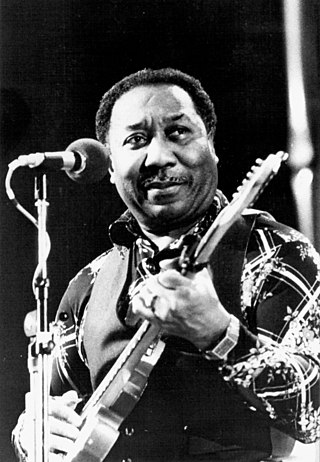
McKinley Morganfield, known professionally as Muddy Waters, was an American blues singer and musician who was an important figure in the post-World War II blues scene, and is often cited as the "father of modern Chicago blues". His style of playing has been described as "raining down Delta beatitude".

Muddy Waters (1913–1983) was an American blues artist who is considered a pioneer of the electric Chicago blues and a major influence on the development of blues and rock music. He popularized several early Delta blues songs, such as "Rollin' and Tumblin'", "Walkin' Blues", and "Baby, Please Don't Go", and recorded songs that went on to become blues standards, including "Hoochie Coochie Man", "Mannish Boy", and "Got My Mojo Working". During his recording career from 1941 to 1981, he recorded primarily for two record companies, Aristocrat/Chess and Blue Sky; they issued 62 singles and 13 studio albums.

Paul Vaughn Butterfield was an American blues harmonica player, singer and bandleader. After early training as a classical flautist, he developed an interest in blues harmonica. He explored the blues scene in his native Chicago, where he met Muddy Waters and other blues greats, who provided encouragement and opportunities for him to join in jam sessions. He soon began performing with fellow blues enthusiasts Nick Gravenites and Elvin Bishop.
Chicago blues is a form of blues music that developed in Chicago, Illinois. It is based on earlier blues idioms, such as Delta blues, but is performed in an urban style. It developed alongside the Great Migration of African Americans of the first half of the twentieth century. Key features that distinguish Chicago blues from the earlier traditions, such as Delta blues, is the prominent use of electrified instruments, especially the electric guitar, and especially the use of electronic effects such as distortion and overdrive.

Otis Spann was an American blues musician, whom many consider to be the leading postwar Chicago blues pianist.

Michael Bernard Bloomfield was an American blues guitarist and composer. Born in Chicago, he became one of the first popular music stars of the 1960s to earn his reputation almost entirely on his instrumental prowess, as he rarely sang before 1969. Respected for his guitar playing, Bloomfield knew and played with many of Chicago's blues musicians before achieving his own fame and was instrumental in popularizing blues music in the mid-1960s. In 1965, he played on Bob Dylan's Highway 61 Revisited, including the single "Like a Rolling Stone", and performed with Dylan at that year's Newport Folk Festival.

James Henry Cotton was an American blues harmonica player, singer and songwriter, who performed and recorded with many fellow blues artists and with his own band. He also played drums early in his career.

At Newport 1960 is a live album by Muddy Waters recorded during his performance at the Newport Jazz Festival on July 3, 1960. With his longtime backup band, Muddy Waters plays a mix of his older popular tunes and some newer compositions. Chess Records released the album in the United States on November 15, 1960.
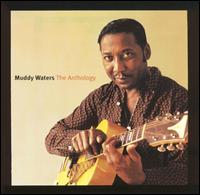
The Anthology: 1947–1972 is a double compilation album by Chicago blues singer and guitarist Muddy Waters. It contains many of his best-known songs, including his R&B single chart hits "I'm Your Hoochie Coochie Man", "Just Make Love to Me ", and "I'm Ready". Chess and MCA Records released the set on August 28, 2001.

The London Howlin' Wolf Sessions is an album by blues musician Howlin' Wolf released in 1971 on Chess Records, and on Rolling Stones Records in Britain. It was one of the first super session blues albums, setting a blues master among famous musicians from the second generation of rock and roll, in this case Eric Clapton, Steve Winwood, Charlie Watts, and Bill Wyman. It peaked at #79 on the Billboard 200.

"Trouble No More" is an upbeat blues song first recorded by Muddy Waters in 1955. It is a variation on "Someday Baby Blues", recorded by Sleepy John Estes in 1935. The Allman Brothers Band recorded both studio and live versions of the song in the late 1960s and 1970s.
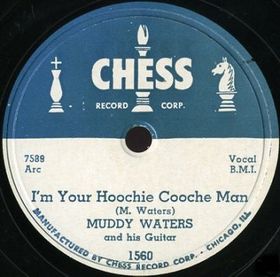
"Hoochie Coochie Man" is a blues standard written by Willie Dixon and first recorded by Muddy Waters in 1954. The song makes reference to hoodoo folk magic elements and makes novel use of a stop-time musical arrangement. It became one of Waters' most popular and identifiable songs and helped secure Dixon's role as Chess Records' chief songwriter.

"Evil", sometimes listed as "Evil (Is Going On)", is a Chicago blues song written by Willie Dixon. Howlin' Wolf recorded the song in Chicago for Chess Records in 1954. It was included on the 1959 compilation album Moanin' in the Moonlight. When he re-recorded it for The Howlin' Wolf Album in 1969, "Evil" became Wolf's last charting single, reaching number 43 Billboard R&B chart.
"I'm Ready" is a blues song written by Willie Dixon and first recorded by Muddy Waters in 1954. It was a hit, spending nine weeks on the Billboard R&B chart where it reached number four. The song became a blues standard and has been compared to "Hoochie Coochie Man", the standard also written by Dixon that Waters recorded earlier in 1954.

The Best of Muddy Waters is a greatest hits album by Muddy Waters released by Chess Records in April 1958. The twelve songs were originally issued as singles between 1948 and 1954 and most appeared in Billboard magazine's top 10 Rhythm & Blues Records charts.
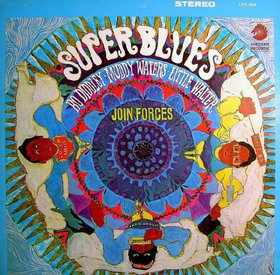
Super Blues is a 1967 studio album by a blues supergroup consisting of Bo Diddley, Muddy Waters, and Little Walter. The album was released in both mono and stereo formats by Checker Records in June 1967. A follow-up album The Super Super Blues Band was released later that year and featured Howlin' Wolf replacing Little Walter.

Jeffrey M. Carp was an American blues harmonica player. He was best known for his work with Muddy Waters, John Lee Hooker, and Howlin' Wolf. He played harmonica on numerous charting blues albums. He was also for a period of time, a side man in Earl Hooker's band.

Muddy Waters Sings "Big Bill" is the first studio album, but second overall album by blues musician Muddy Waters, featuring songs by Big Bill Broonzy, released by the Chess label in 1960.

The Muddy Waters Woodstock Album is an album by blues musician Muddy Waters released by the Chess label in 1975. The album features Levon Helm and Garth Hudson from The Band and Paul Butterfield.
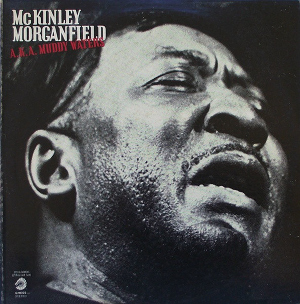
McKinley Morganfield A.K.A. Muddy Waters is a compilation album by blues musician Muddy Waters featuring tracks recorded between 1948 and 1953 released by the Chess label in 1971.


















